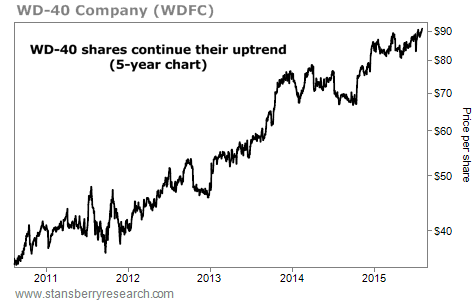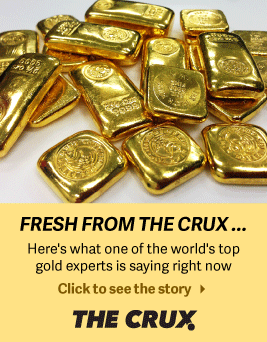| Home | About Us | Resources | Archive | Free Reports | Market Window |
|
Editor's note: Today, we're sharing an important essay from Casey Research's E.B. Tucker. E.B. is the senior analyst of The Casey Report and has a track record of identifying megatrends and profiting from them. Below, he explains one of the most important financial stories of the past decade to show...
Why Your Brokerage Account Isn't as Safe as You Think It IsBy
Friday, August 7, 2015
Imagine logging into your brokerage account tomorrow and finding out that it's frozen.
Not just your account... every customer account at your brokerage is frozen.
You can't buy stocks. You can't sell stocks. You can't move money out of the account.
Your account representative insists the money is still there. It's just not available now. He doesn't know when it will be.
When you demand to transfer $25,000 in cash out of the account, he says, "I'm sorry... the system won't let me."
You ask to speak to his boss. She can't help, either.
This situation sounds absurd to most Americans. There's no way a major broker could freeze your accounts, right?
Wrong. It happened in 2011 to 38,000 people...
And this wasn't some no-name broker. It was a highly respected, 228-year-old firm. And Jon Corzine ran it. At one point or another, Corzine was a U.S. senator, the governor of New Jersey, and the CEO of Goldman Sachs. Then, he became the CEO of MF Global.
MF Global handled stock and bond trading for some of Wall Street's wealthiest clients.
It was also one of only 18 "primary dealers" at the time. Primary dealers are a select group of brokers allowed to participate in the U.S. Treasury auction. Citigroup, Morgan Stanley, and Goldman Sachs are also primary dealers.
Like all U.S. brokers, MF Global was required to keep customers' cash and stocks separate from its own corporate accounts. This rule is supposed to keep brokers from playing with customers' money. But the rule only works if brokers follow it.
In October 2011, account holders at MF Global started having problems withdrawing cash and transferring stocks. It turned out that their money wasn't there. MF Global had made a series of bad bets in European bonds and illegally transferred $891 million in customer funds to cover its trading losses.
Their cash was gone...
Customers had to hire and pay for their own attorneys. For a while, it looked like they'd never get their money back. But in December 2014, MF Global finally agreed to return $1.212 billion to its former clients. It also paid a $100 million fine.
You might be wondering how this sort of thing could happen...
First off, you are not the legal or registered owner of the stocks in your brokerage account. You're just the "beneficial owner."
Sure, you put the cash in your account. You logged in and "bought" Apple, General Electric, Verizon, and other stocks issued by sound companies. You did your homework because you worked hard for your money. Those investments are a key part of your retirement plans. You don't make risky moves.
And you work with a reputable broker. But your broker or a clearinghouse called Cede and Company is likely the registered owner of "your" stocks.
Here's how it works...
There are three basic ways to hold stocks: street name registration, direct registration, and physical certificate. Street name is the default. Unless you make special arrangements, this is how stocks are registered.
Cede and Company, a subsidiary of The Depository Trust Company (DTC), is likely the registered owner of your stocks. You are not the registered owner. When you buy a stock, DTC holds those shares for your broker. Your broker, in turn, holds those shares for you.
That means Apple, General Electric, Verizon, and the other companies in which you hold stocks have no record of you.
If your broker mishandles your account, you can sue to get your money back. But, as MF Global customers discovered, it's not easy. And there's no guarantee you'll win...
If your broker makes a bad bet on Greece and uses your cash to settle the bill, you're out of luck. Sure, it's illegal... but laws didn't stop MF Global. Customers had to take action, hire lawyers, and sue to get their cash back.
Stable markets hide problems. In 2008, we saw that big problems can go unnoticed for years. A crisis reveals who's stable and who's just pretending to be. Some brokers and financial institutions are heavily leveraged. They're especially vulnerable in a crisis. Some will not survive the next one.
The MF Global fiasco is one of the most important financial stories of the past decade. It showed that the financial system isn't as safe as you think it is. Even big, brand-name banks and brokerages with years of success can instantly go broke.
The next financial crisis will bring many more shams like MF Global's to light.
You can protect yourself by keeping plenty of cash and gold in a safe place... but not in a safe-deposit box.
And make sure to diversify across financial institutions. You don't want to get stuck in a situation like MF Global's customers did... waiting years for your money because some executive gambled away the company.
Regards,
E.B. Tucker
Further Reading:
As Jeff Clark explained in Growth Stock Wire earlier this year, "just as you prepare for a hurricane, an earthquake, or any other form of natural disaster, you should also prepare for a financial disaster." Learn the three steps he recommends taking right here.
In this classic DailyWealth essay, Mark Ford explains how to talk your broker into submission... "How do you feel now about the professionals who are working for you?" he asks. "Have you realized you may be getting less from them than you deserve?" Mark's common-sense guide to evaluating your professional relationships gives you the tools you need to overcome "expert" intimidation... and make sure you're the one in charge.
Market NotesTHIS "BORING" BUSINESS KEEPS CHUGGING ALONG "Boring" works... just take a look at today's chart for the latest example...
As longtime readers know, we're fans of simple businesses... the types of companies that sell the everyday products people buy without thinking twice. These businesses have a history of beating the market and they often make for steady, reliable investments. But because they are considered dull, these companies sometimes get overlooked in place of more exciting stocks.
One of these hidden market gems over the last few years has been WD-40 Company (WDFC). Everyone is familiar with WD-40. Almost every American has a can lying around in the garage or under the kitchen sink. It has an incredibly powerful brand and is the go-to solution for a number of household tasks.
As you can see from the chart below, people are still buying cans of WD-40... The stock has soared more than 150% over the last five years and shares just struck a new all-time high this week. It's yet another example that some of the best businesses in the world are also the least "exciting"...
 |
Recent Articles
|



